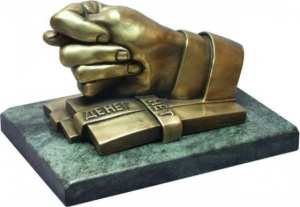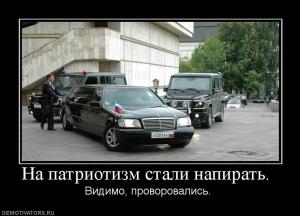
The support for Vladimir Putin, displayed by the Russian political elite, turns into material benefits, especially valuable during an economic crisis. The status of a State Duma deputy or the leadership in a war against “sacrilegious” theatrical productions allows one to send creditors to hell. In order to avoid paying off debts or be able to accuse bankers of “illegal seizures,” one can shelter oneself behind patriotism or build tanks that “have no match among their Western analogues.” No one will dare to hurt a true Russian patriot whom the Kremlin believes to be credible.
Since the Soviet times, the fact of belonging to the power circles, or the so-called nomenklatura, has always meant access to certain material privileges, that is to goods inaccessible to ordinary people. In modern “market-oriented” Russia, the possibility to avoid paying off debts has become such a privilege for the nomenklatura members who have once again usurped power in the country. Vedomosti newspaper, Russia’s top business daily, compiled information about the worst non-payers among Russian lawmakers. The debt of deputy of the State Council of the Republic of Tatarstan Mingazov amounts to 5.14 billion rubles; State Duma deputy Mikheyev’s debt reaches 5.08 billion rubles; the debt of deputy of the Volgograd Regional Duma Murylev is estimated at 1.73 billion rubles. Speaking to Vedomosti, an anonymous source declared that, due to the influence of “non-payers withing the government,” creditors face a “strong informal opposition” throughout the entire debt collecting process from trial to court enforcement proceedings. Furthermore, it turns out that “servants of the people” simply do not have any assets in their possession: apparently, everything belongs to their family members or even, legally speaking, to a third party. Why should one pay if one can use administrative resources with regard to one’s creditors? Besides, since bankers themselves are very familiar with this situation, they solve it by transferring the burden of unpaid debts to the ordinary customers through increased interest rates. Thus, annual mortgage interest rates are currently reaching 20 percent, while consumer credit rates reach 50 percent. Not to mention payday loans, the average annual cost of which in Russia amounts to astronomic 720 percent. Delinquency rates on retail credit debts are skyrocketing, and, as of April 1, 2015, are showing a shocking 53.9 percent annual increase.
Despite Putin’s increasing poll standings, no one is planning to reward ordinary people for voting “correctly” by forgiving their debts. However, some people’s eager patriotism pays off rather well. A public conflict between the new Director of Novosibirsk State Theater of Opera and Ballet Vladimir Kekhman, a bankrupt businessman and former director of the St. Petersburg Mikhailovsky theater in the 2000s, and Sberbank that is currently failing to get back a multimillion credit once provided to Kekhman, serves as a very good example. Despite an embezzlement case opened against him, Kekhman has advantageously fitted into the “correct” political trend by proving his loyalty through demonstrating an uncompromising approach to the much publicized theatrical production of Wagner’s Tannhäuser in Novosibirsk that was banned for “insulting religious feelings.” After showing support for the Russian Orthodox Church in its confrontation with “damned liberals,” Kekhman came down on Sberbank CEO German Gref by calling him a “tool of the devil”. It is not up to us to decide whether the history of the state-owned Sberbank has anything to do with the devil, as well as what to happen first: Kekhman pays off his debt or Gref appears at the Doomsday.

Top management of Uralvagonzavod, Russia’s major producer of armored vehicles, for which bankruptcy Alfa-Bank intends to file a petition, also believes it unnecessary to pay off the corporate debts. The head of Uralvagonzavod did not stint his epithets directed at the Uralvagonzavod’s creditor. And while he was accusing bankers of a “treacherous attack” and “blackmail”, the new “Armata” tank platform, Uralvagovzavod’s most recent and obviously imperfect effort, was participating in the military parade in Red Square to commemorate the 70th anniversary of the victory over Nazi Germany. Thus, a manufacturer of obsolete military equipment, who is deeply mixed up in corruption and inefficiency, but is close to the Kremlin, demands special treatment and in return does not just show loyalty but is prepared to fight for Putin’s regime. However, the question is whether the country’s banking system will be able to withstand the Russian elite’s overwhelming degree of patriotism.





